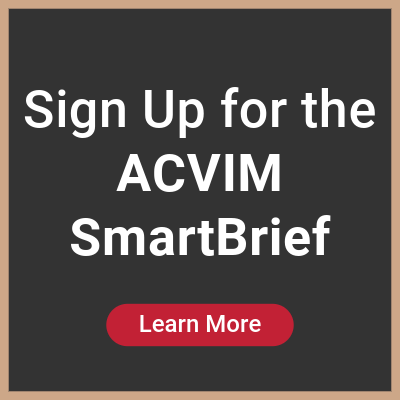Member Spotlight: Christine Jenkins, DVM, DACVIM (SAIM)

Christine Jenkins, DVM, DACVIM (SAIM) | Chief Medical Officer, VP Veterinary Medical Services & Outcomes Research, Zoetis Inc.
After I received my B. S. degree from Florida A & M University, I spent 2 years in a post-baccalaureate program at the University of Florida’s College of Veterinary Medicine. There I worked part-time as a research assistant which exposed me to a broad range of specialists. This experience opened my eyes to the broad array of opportunities for veterinary specialists. During veterinary school at Tuskegee University I spent a couple of summers at UF which solidified my interest in specialty medicine. During my senior year at Tuskegee, University of Florida offered me an internship that prepared me my residency training at the University of Tennessee in small animal internal medicine.
Is there a story or experience that stands out in your mind that reaffirmed your decision to work in veterinary specialty medicine?
My internship at UF solidified my strong interest in small animal internal medicine. I was intrigued by the complexity of the cases and the access we had to advanced diagnostics, therapeutic regimens and having a multitude of specialists for consultations.
What do you consider one of your greatest career successes? How did you achieve it?
My greatest success has been to transition into leadership roles within the animal health industry. I attribute many of my career opportunities to those that built my confidence as a leader and those that took a chance on me in various roles. I think we all have to be willing to try new things and not be afraid to fail-that’s how we learn to get better.
What do you consider a challenge you’ve faced in your career? How did you overcome it?
My biggest challenge has been related to being adaptable as a leader as organizations and our profession continue to evolve and change. One of the I have become more adaptable is to expect that change is inevitable and should be expected, versus unexpected. I also take the time to “breathe” through the change so I can better help my team adapt in a positive way.
You’ve been a member of the ACVIM for nearly 30 years. How have you seen the organization and the profession change over that time?
First, I cannot believe it’s been 30 years. I’ve seen the organization respond to the change in the makeup of its members from mostly academicians- to specialty practitioners predominately. I have seen us have to be more agile in how the College supports its members since we represent more specialties and sub-specialties.
How would you like to see the ACVIM and the profession improve or change in the future?
Our biggest challenge is addressing the need for more specialists for both academia and private practice. We need to work together to inspire talented students to join the profession and to specialize so we can fill academic positions as well as private specialty positions. ACVIM and other specialty colleges should work together to build strategies that expose and attract underrepresented minorities into our profession and into specialized veterinary medicine.
